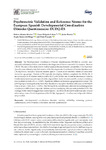Mostrar o rexistro simple do ítem
Psychometric validation and reference norms for the European Spanish Developmental Coordination Disorder Questionnaire: DCDQ-ES
| dc.contributor.author | Montes-Montes, Rebeca | |
| dc.contributor.author | Delgado-Lobete, Laura | |
| dc.contributor.author | Pereira-Loureiro, Javier | |
| dc.contributor.author | Santos-del-Riego, Sergio | |
| dc.contributor.author | Pousada, Thais | |
| dc.date.accessioned | 2020-04-20T10:37:47Z | |
| dc.date.available | 2020-04-20T10:37:47Z | |
| dc.date.issued | 2020-04-02 | |
| dc.identifier.citation | Montes-Montes R, Delgado-Lobete L, Pereira J, Santos-Del-Riego S, Pousada T. Psychometric validation and reference norms for the European Spanish Developmental Coordination Disorder Questionnaire: DCDQ-ES. Int J Environ Res Public Health. 2020 Apr 2;17(7):2425. | es_ES |
| dc.identifier.issn | 1661-7827 | |
| dc.identifier.issn | 1660-4601 | |
| dc.identifier.uri | http://hdl.handle.net/2183/25374 | |
| dc.description.abstract | [Abstract] The Developmental Coordination Disorder Questionnaire (DCDQ) is a widely used and well-validated tool that contributes to the diagnosis of Developmental Coordination Disorder (DCD). The aim of this study was to further analyze the psychometric properties of the European Spanish cross-culturally adapted version of the Developmental Coordination Disorder Questionnaire (DCDQ-ES) in a sample of Spanish children aged 6–11 years and to establish reference norms with respect to age groups. Parents of 540 typically developing children completed the DCDQ-ES. A second sample of 30 children with probable DCD (pDCD) was used to test its discriminant validity. Confirmatory factor analysis supported the original three-factor structure and the internal consistency was excellent (Cronbach’s α = 0.907). Significant differences between age groups were found. The pDCD group scored significantly lower than the reference sample in the three subscales and DCDQ-ES total score (p < 0.001; AUC = 0.872). The DCDQ-ES is a reliable and valid tool for screening motor coordination difficulties in Spanish children and for identifying children with probable DCD. The findings of this research suggest that context-specific cut-off scores should be systematically utilized when using cross-cultural adaptations of the DCDQ. Age-specific cut-off scores for Spanish children are provided. | es_ES |
| dc.description.sponsorship | Xunta de Galicia; ED481A 2018/150 | es_ES |
| dc.description.sponsorship | Xunta de Galiclia; ED431G 2019/01 | es_ES |
| dc.description.sponsorship | This research was partially funded by the European Social Fund 2014–2020 and Galician Government, grant number ED481A-2018/150. The APC was funded by CITIC, Research Centre of the Galician University System, supported by the Consellería de Educación, Universidade e Formación Profesional of Xunta de Galicia through the European Regional Development Fund (ERDF) with 80%, Operational Programme ERDF Galicia 2014–2020 and the remaining 20% by the Secretaría Xeral de Universidades, grant number ED431G 2019/01. | |
| dc.language.iso | eng | es_ES |
| dc.publisher | MDPI | es_ES |
| dc.relation.uri | https://doi.org/10.3390/ijerph17072425 | es_ES |
| dc.rights | Creative Commons Attribution 4.0 International License (CC-BY 4.0) | es_ES |
| dc.rights.uri | https://creativecommons.org/licenses/by/4.0/ | |
| dc.subject | Developmental coordination disorder | es_ES |
| dc.subject | Validity | es_ES |
| dc.subject | Reliability | es_ES |
| dc.subject | Screening | es_ES |
| dc.subject | Parental questionnaire | es_ES |
| dc.subject | Developmental coordination disorder questionnaire | es_ES |
| dc.title | Psychometric validation and reference norms for the European Spanish Developmental Coordination Disorder Questionnaire: DCDQ-ES | es_ES |
| dc.type | info:eu-repo/semantics/article | es_ES |
| dc.rights.access | info:eu-repo/semantics/openAccess | es_ES |
| UDC.journalTitle | International journal of environmental research and public health | es_ES |
| UDC.volume | 17 | es_ES |
| UDC.issue | 7 | es_ES |
| UDC.startPage | 2425 | es_ES |







